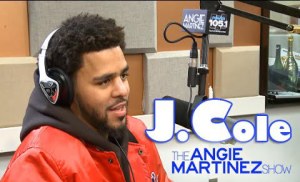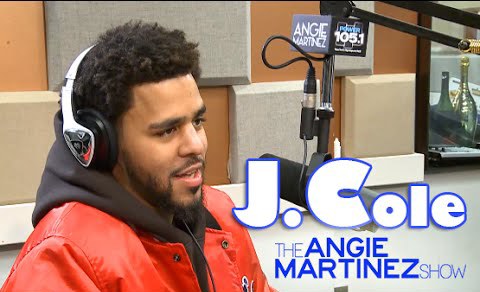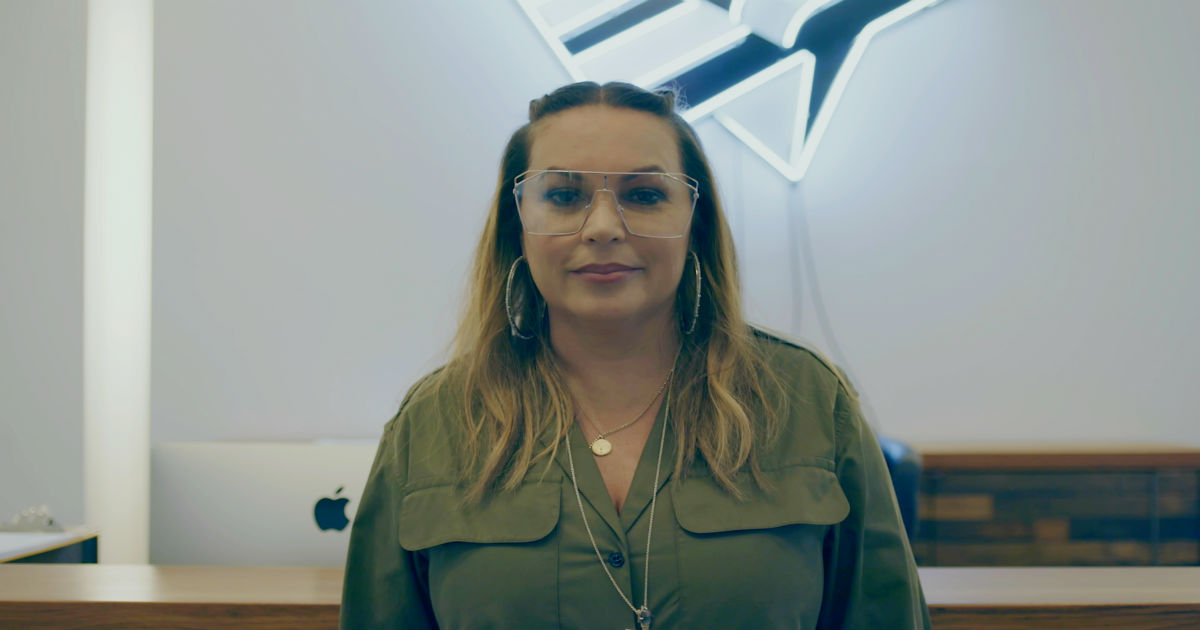9 Things You Should Undserstand About J. Cole’s Angie Martinez Interview
 Two weeks ago I wrote a post clowning J. Cole’s hair. I wanted to see two things: if you guys are with me– like, actually reading my blog, and to sort of praise Cole.
Two weeks ago I wrote a post clowning J. Cole’s hair. I wanted to see two things: if you guys are with me– like, actually reading my blog, and to sort of praise Cole.
Read carefully. I spend far more time outlining what he’s been doing in the wake of the country’s current racial tensions than I did downing him. I’m happy to see that you guys understood what was up and that you’re back for more.
This weekend, I caught snippets of the J. Cole’s December 12th interview with Power 105.1’s Angie Martinez on Instagram. Each clip was a spark to light the fire of my heart and intellect. I had to head over to YouTube to find the full interview and get my socially conscious life!
After watching, here are 9 of my takeaways from J. Cole:
The David Letterman Performance
Last week J. Cole performed the song “Be Free” which he wrote in the wake of the police killing of unarmed Michael Brown in Ferguson, Mo this summer. This performance went viral the next day, not only because of his deliberate delivery or timeliness of the confusing non-indicment Grand Jury decisions in the Brown and NYPD chokehold death of unarmed Eric Garner earlier this year, but also because he added another poignant verse.
Angie asked him about it and he confessed that he watched the heart wrenching video of the Garner murder to put himself in the mindframe he was in when he wrote this piece. Cole said he had to pump himself up to perform the new verse in spite of his nerves. He explains, “The David Letterman audience was 97 and a half percent white.”
By the end of the passionate performance, not only is the audience cheering and applauding, David Letterman calls him “sir.” The honesty of his music helped bridged the gap, even if only for a few in that crowd, and earned him another level of respect.
Hip hop Unites races. Brings people together. Let’s keep it that way.
— MIKE DEAN! #MWA (@therealmikedean) December 21, 2014
The Non-Confrontational Challenge of Fraudulent Rappers
What I mean by this is, without name dropping or trash talking, we all know who Cole is referring to when he says, “These dudes portraying a lifestyle that A) They probably didn’t live and B) even if you did you don’t know more, but you still trynna milk us. …You still trynna pump this lifestyle.”
He recognizes the toxicity of this mentality and what it is and has been doing to its listeners for decades. His disdain has encouraged him to go against the grain, reach deep within himself and rebel against the status quo. Thus, 2014 Forest Hills Drive.
Be The Change
The fearless 29-year-old takes a level of responsibility for his contribution to Hip-Hop and the world, and that is admirable.
“If I’m speaking my mind and saying how I truly feel, I could say that one thing that connects the dots for somebody that… can change the world,” said Cole.
Angie Martinez expressed her appreciation by saying this mentality is “a breath of fresh air.” I must agree.
It’s All About Distractions
Just going to leave these three quotes here:
“The people at the top love the fact that everybody is so busy with themselves and their own lives that they don’t have the time to stand for something or to fight for something.”
“Life happens… and you don’t have the time to fight for nothing no more– you don’t have the time to even care. ‘Because I got my own kids. Yeah, this man died, but I got bills. And Twitter poppin’ right now. And Instagram is hot. And Love and Hip Hop reunion is on.’
It’s like they just love to distract you, and like keep you occupied while they just molest the world.”
America Is More Capitalistic Than It Is Democratic
Ok, I can admit, these are my thoughts and Cole didn’t say these words, but he I’m pretty sure if I got the chance to talk to him we’d agree.
“This system we live in; this system of capitalism teaches every person– If I walk pass you on the streets of New York City, I can be absolutely positive… that whatever you’re doing in your life’s work is for you, and your benefit only.”
He then proceeds to break down, in laymans terms, what is capitalism with an illustration of McDonald’s organizational structure, and a comparison to slavery in regards to working wage. Cole believes this is the root of all the problems we’re seeing.
Question Everyone’s Motives
J. Cole gives us another example of capitalism at work in the pharmaceutical industry. He explains that it’s in the drug companies’ best interest to make medication that does not heal us, rather creates a dependency that makes us keep coming back. As with the tech, food and entertainment industries.
“We got a bunch of folk in America doing things that don’t need to be done for profit… You’re making food that doesn’t help. It actually hurts us. That food is killing us, but it makes money. That television show is hurting us, but it makes money. This music is killing us, it’s rotting us, but it makes money. That’s the system we live in.”
Debunking the Communications Industry
In case you didn’t know, all media is paid for by advertising.
Whether a commercial between broadcast segments, product placement in your favorite movie or an ad that looks like a magazine article, this is how media companies make money. As such, it is in these outlets’ best interest to get as many consumers to tune in and visit their pages so that they can boast higher circulation and charge brands more.
So as a member of the media, I absolutely heed you to take caution of which outlets you trust and frequent. Fellow Comm major J. Cole explains why:
“This whole system is not set up to bring truth. It’s not set up to bring the real news. The news ain’t setup to inform you, it’s set up to make money.”
The Real Life Application of Controversial Verse in “Fire Squad”
Of course Angie Martinez would be remiss if she didn’t bring up J. Cole’s perceived “diss” to white rappers in his song “Fire Squad.”
Click Baiters and those whose comprehension skills (or maybe simply those in denial) have caused a firestorm accusing Cole of anything but telling the truth.
Not only was he prepared to defend his verse and express his respect and adoration for Eminem, who is mentioned in the “observation” of cultural appropriation, but he did a case study!
He said he had been looking for new music to listen to and decided he’d search iTunes for Jazz. What he found surprised and disturbed him. He said the page he came across was loaded with “99.7 percent white people.”
“Jazz is a black form of music in its origins. And no only was it black in its origins, it was the Hip-Hop of its day. It was that much of a rebellious music. It wasn’t the traditional, it was just freestyle,” said Cole.
He reflects on how crazy it is to think on 40-50 years later, it is completely dominated by whites to the point that he even thought Kenny G was Jazz before he learned better.
He says that now is the point in time where the switch has been flipped, and Hip-Hop is increasingly whitewashed. The ability to capitalize off the fact that one artist, someone like a Macklemore or Iggy Azalea looks like 54% of the American population influences labels to push those artists over another.
The Commercialism of Black Culture & Systematic Racism
Which led Cole to expound on commercialism in relation to systemic racism. He points out that every time there’s a new form of black music, this sort of takeover happens.
He lists Jazz, Rhythm & Blues and Rock & Roll as examples. (Learn the progression of American Music History here.) Cole points out that black people are at the bottom of the totem pole in America as the oppressed people, but we still find the a way to come up with something new.
“And what happens? America gets a hold of it, they fall in love with it… [and] everytime the system gets a hold of it, it’s over. It gets commercialized. It gets pimped out,” said Cole.


A Cole World In Need – MILLENNIAL STATE
[…] The Bobby Pen Article: https://www.thebobbypen.com/9-things-i-love-about-j-coles-angie-martinez-interview-part-i/ […]